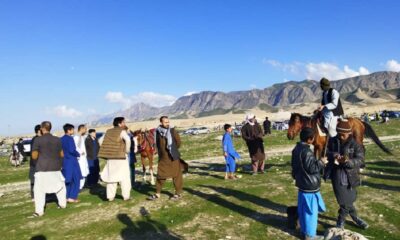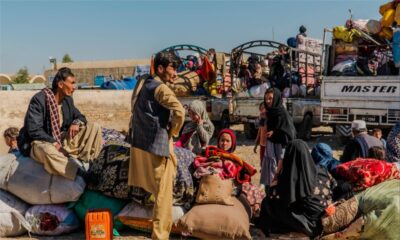Climate Change
Over 160 die in Afghanistan as extreme cold sweeps across the country
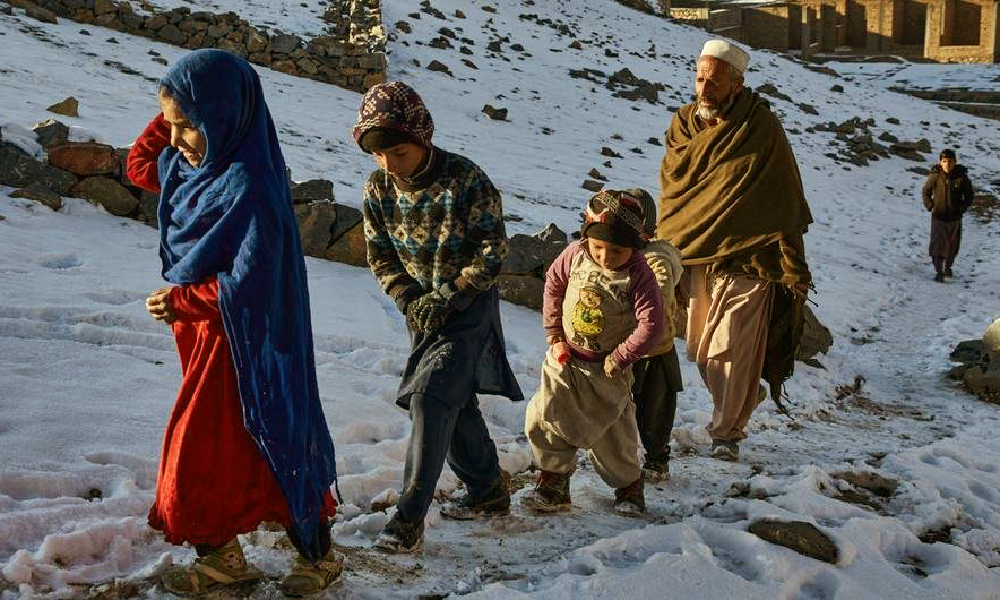
A cold snap in Afghanistan has killed over 160 people and more than 200,000 livestock in what officials say is its coldest winter in 15 years.
Temperatures in some parts of the country have plummeted to -33 degrees Celsius and heavy snowfalls have been recorded across the nation – which is grappling with a severe humanitarian crisis.
The country’s disaster management agency said on Saturday that the death toll had risen by 88 over the past week and now stood at 166, based on data from 24 of Afghanistan’s 34 provinces.
Ministry official Abdul Rahman Zahid said in a video statement that the deaths were caused by floods, fires and leaks from gas heaters, while about 100 homes have been destroyed.
“The Afghan winter … as everybody in Afghanistan knows, is the big messenger of doom for so many families in Afghanistan as we go through these many years of humanitarian need … we see some of the consequences in loss of life,” UN aid chief Martin Griffiths said.
The World Health Organization (WHO) said this week 17 people had died in a single village in northeastern Badakhshan province due to an outbreak of “acute respiratory infection.”
“Harsh weather prevents help from reaching the area,” the WHO said.
Climate Change
Tornadoes, heavy rains rip across central, southern US
Millions of people are under alerts for tornadoes and flash floods and dangers will continue into early Thursday
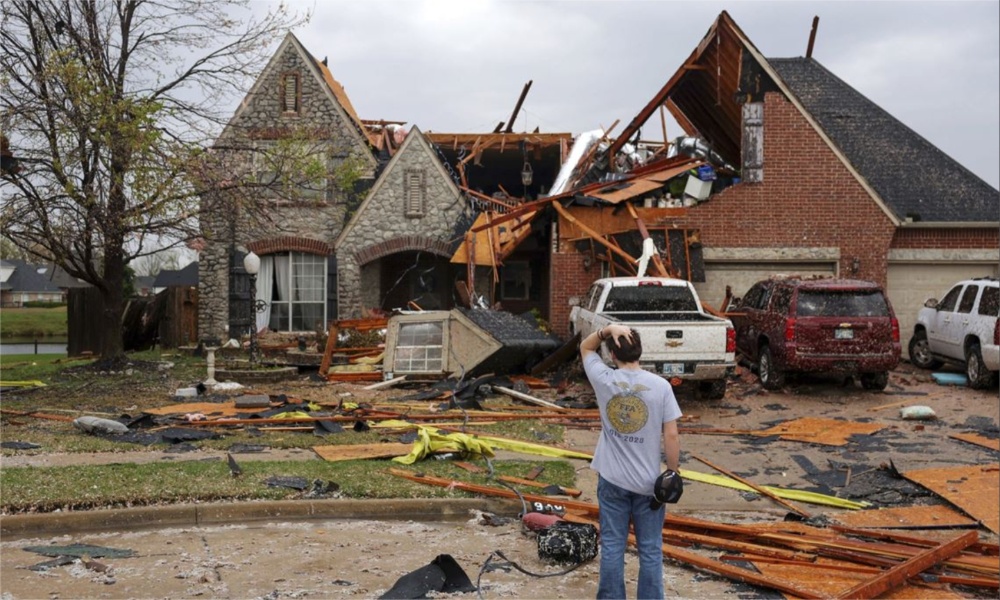
Tornadoes ripped across a wide swath of central and southern United States on Wednesday, destroying homes and businesses and bringing down power lines and trees.
The National Weather Service said there had been at least 15 reports of tornadoes in at least four states by late Wednesday.
Eight people have been injured across Kentucky and Arkansas, including one critically injured in Kentucky’s Ballard County, local officials said.
Late Wednesday, Arkansas Governor Sarah Huckabee Sanders declared a state of emergency across the state due to the storms, which also brought hail and torrential rain, Reuters reported.
The NWS said millions of people were under alerts for tornadoes and flash floods and that dangers would continue into early Thursday.
Violent storms are forecast to ravage the country for several days, the NWS said, with Wednesday just “the beginning of a multi-day catastrophic and potentially historic heavy rainfall event.”
“The word for tonight is ‘chaotic’,” said Scott Kleebauer, a NWS meteorologist. “This is a large expanse of storms migrating slowly to the east, stretching from southeast Michigan down into southeastern Arkansas.”
The town of Nevada, Missouri, was hit by a tornado. Writing on social media, the state’s Emergency Management Agency said it caused “major damage to several businesses, power poles were snapped and several (empty) train cars were flipped onto their sides by the powerful storm!”
The NWS issued tornado and flash flood warnings for parts of Missouri, Arkansas, Tennessee, Mississippi, Indiana, Illinois, Kentucky and Oklahoma.
It called the rain threats for Arkansas, Missouri, Tennessee and Mississippi in the coming days a “generational flood event” with some locations forecast to see as much as 15 inches (38.1 cm) of rain by the weekend, which could cause rivers to burst their banks and cause “catastrophic river flooding.”
More than 400,000 customers had their power knocked out across the storm-hit area, according to PowerOutage.us.
Climate Change
UN urges aid to Myanmar quake survivors before monsoons hit, death toll climbs towards 3,000
Aid groups in Myanmar warned that the window to find survivors was closing fast.
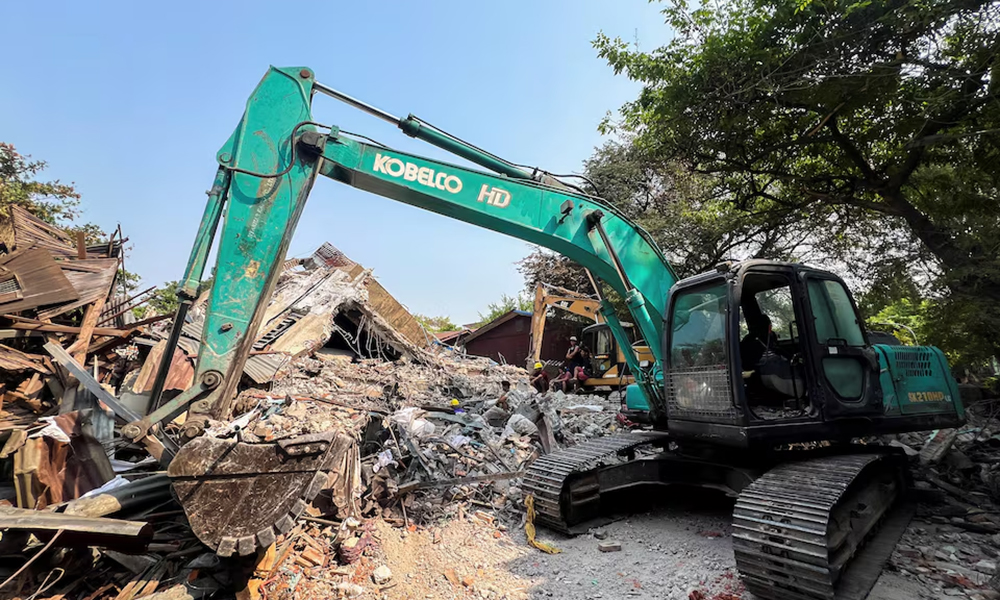
United Nations officials who surveyed earthquake damage in Myanmar urged the global community on Tuesday to ramp up aid before the looming monsoon season worsens already catastrophic conditions, with the death toll at 2,719 and expected to surpass 3,000.
Drinking water, hygiene, food, shelter and medicine are the most critical needs following extensive damage to buildings, roads and bridges, said Marcoluigi Corsi, acting humanitarian and resident coordinator following a two-day visit.
“We remain, of course, deeply committed to reaching people in Myanmar who need aid,” U.N. spokesperson Stephane Dujarric said. “And we must act swiftly to provide relief before the upcoming monsoon season, which, of course, will even worsen this horrendous crisis.”
A civil war in Myanmar had displaced more than 3 million people long before the quake struck. U.N. Special Envoy for Myanmar Julie Bishop urged all sides to immediately cease fire, permit humanitarian access and ensure aid workers are safe.
“Continuing military operations in disaster-affected areas risks further loss of life,” she said in the statement.
Aid groups in Myanmar warned that the window to find survivors was closing fast.
Myanmar’s military ruler Min Aung Hlaing said the death toll from Friday’s 7.7 magnitude quake reached 2,719 as of Tuesday morning and was expected to surpass 3,000. Some 4,521 people were injured and 441 missing.
“Among the missing, most are assumed to be dead. There is a narrow chance for them to remain alive,” he said in a speech.
The quake, which struck at lunchtime on Friday, was the strongest to hit the Southeast Asian country in more than a century. It toppled ancient pagodas and modern buildings alike and inflicted significant damage on Myanmar’s second city Mandalay and Naypyitaw, the capital the previous junta purpose-built to be an impregnable fortress.
U.N. agencies said hospitals were overwhelmed and rescue efforts hindered by infrastructure damage and the civil war. Rebels have accused the military of conducting airstrikes even after the quake and on Tuesday a major rebel alliance declared a unilateral ceasefire to help relief efforts.
The earthquake was the latest in a succession of blows for the impoverished country of 53 million people following a 2021 coup that returned the military to power and devastated the economy after a decade of development and tentative democracy.
Myanmar’s military has been accused of widespread atrocities against civilians as it fought to quell a multi-pronged rebellion after the coup. It has dismissed the accusations as misinformation and says it is protecting the country from terrorists.
In neighbouring Thailand, the death toll from the quake rose to 21 on Tuesday, with hundreds of buildings damaged. Rescuers kept searching for life in the rubble of a collapsed skyscraper under construction in the capital Bangkok, but acknowledged time was against them.
The region has been hit by five more aftershocks.
Julia Rees of the U.N. children’s agency UNICEF said she witnessed entire communities in Myanmar that had been flattened, with immense destruction and psychological trauma.
“And yet, this crisis is still unfolding. The tremors are continuing. Search and rescue operations are ongoing. Bodies are still being pulled from the rubble,” she said in a statement.
“Let me be clear: the needs are massive, and they are rising by the hour. The window for life-saving response is closing.”
In the Mandalay area, 50 children and two teachers were killed when their preschool collapsed, the U.N. humanitarian agency said.
In a rare survival story, a 63-year-old woman who was trapped for 91 hours was pulled from the rubble of a building in Naypyitaw on Tuesday in a joint rescue effort by the Myanmar fire department and teams from India, China and Russia.
Myanmar’s civil war has complicated efforts to reach those injured and made homeless, including tight controls over the internet and communication networks.
The Three Brotherhood Alliance of three major rebel groups at war with the junta on Tuesday declared a unilateral one-month ceasefire, to allow urgent humanitarian efforts to “be carried out as swiftly and effectively as possible”.
In its nightly news bulletin on Tuesday, state-controlled MRTV quoted Min Aung Hlaing as saying the military had halted its offensives but unspecified ethnic minority armies were planning to exploit the disaster.
“The military is aware they are gathering, training, and preparing to attack,” it said, quoting the general as saying at an event to raise funds for quake victims. “We consider it as attacking us and will respond accordingly.”
One rebel group, the Karen National Union, on Sunday said the junta had conducted airstrikes in the east of the country at a time when it should be prioritising quake relief efforts.
Amnesty International said it had received testimony corroborating reports of air strikes near areas where quake recovery efforts were focused.
“You cannot ask for aid with one hand and bomb with the other,” said Amnesty’s Myanmar researcher Joe Freeman.
It was unclear if Min Aung Hlaing would make a rare foreign trip this week to attend a regional summit in Bangkok as planned. Thailand’s on Tuesday said the general may attend by teleconference.
In Bangkok, rescuers were still seeking signs of life in the ruins of an unfinished skyscraper that collapsed, aware that four days after the quake, chances had dimmed of finding survivors.
Fourteen deaths have been confirmed at the site and seven elsewhere in the city. The government is investigating the collapse and initial tests showed some steel samples from the site were substandard.
There were an estimated 70 bodies under the rubble and experts said 12 had been located using scanners, but access was blocked by large debris.
“Maybe they can survive one week or two weeks, so we have to go on,” Bangkok Governor Chadchart Sittipunt said. “The experts still have hope.”
Climate Change
UN and ICRC warn of serious water shortage in Afghanistan
The International Committee of the Red Cross in Afghanistan reported that an estimated 33 million people in the country face severe water shortage
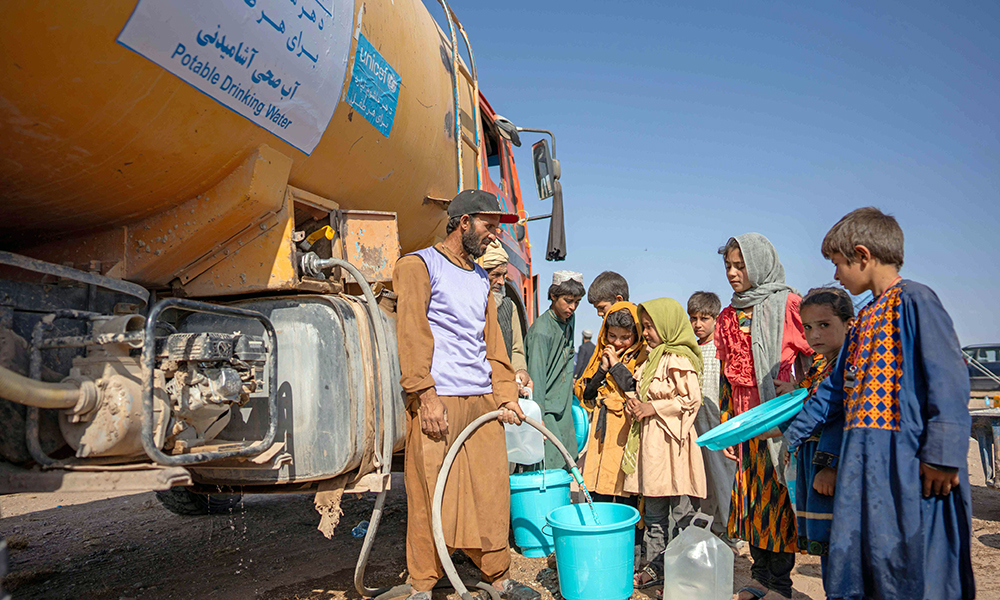
The United Nations Human Settlements Programme (UN Habitat) warned this week that 21 million people in Afghanistan are currently facing a serious water crisis and that the country needs major investments in water infrastructure.
Stephanie Loose, the head of the programme, said in a report that major Afghan cities such as Kabul, Kandahar and Herat are also facing a serious shortage of clean drinking water and that groundwater resources in these cities are decreasing significantly.
However, last week, the International Committee of the Red Cross (ICRC) in Afghanistan reported that an estimated 33 million people in the country face severe water shortage.
Marking World Water Day on March 22, the ICRC quoted a Kabul resident Shafiqullah Hamkar of District 5 in Kabul city as saying: “Our borewells have completely dried up because of the minimal snowfall and rainfall over the last few years.
“The sharp decline in groundwater levels has left us no choice but to rely on commercial water tankers for our most basic needs. It is a big challenge for us in the city,” he said.
ICRC said Hamkar represents an estimated 80% of Afghans who are dealing with the severe impact of erratic rainfall patterns, rising temperatures and droughts.
The situation is even worse in rural areas where people often rely on untreated surface water, which leads to the spread of waterborne diseases such as cholera and diarrhea.
“For millions of Afghans, who are already struggling with many challenges and facing a dire humanitarian situation, vital activities such as getting water to drink or cook and providing irrigation for crops are often impossible. This has a devastating impact on people’s health and access to food, and hampers the country’s potential for economic development,” says Martin De Boer, the head of programs for the International Committee of the Red Cross (ICRC) in Afghanistan.
He added that the lack of required infrastructure – including water-supply systems, dams and irrigation networks – further exacerbates the challenges. Responding to the needs of the people, the ICRC plays an important role in supporting communities and assisting authorities to improve and manage water supplies.
-

 Latest News4 days ago
Latest News4 days agoMinistry of Economy calls on US to release Afghanistan’s frozen funds
-

 Latest News4 days ago
Latest News4 days agoPakistan ‘extends’ deadline for a week for Afghans to leave the country
-

 World5 days ago
World5 days agoAs Iran tensions build, US military moves warplanes to reinforce Middle East
-

 Sport4 days ago
Sport4 days agoIPL 2025: Batters in race for prestigious Orange Cap
-
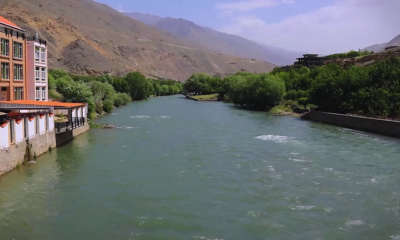
 Latest News4 days ago
Latest News4 days agoPanjshir to Kabul water conduit project ‘waiting for budget approval’
-
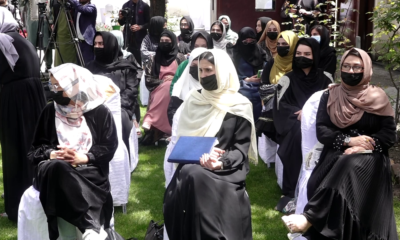
 Latest News4 days ago
Latest News4 days agoFemale journalists complain about lack of access to accurate and timely information
-

 Business3 days ago
Business3 days agoExports to Pakistan grind to a halt over faulty scanner at Torkham
-

 Regional4 days ago
Regional4 days agoMilitary confrontation seems inevitable if no new Iran nuclear deal, France says




